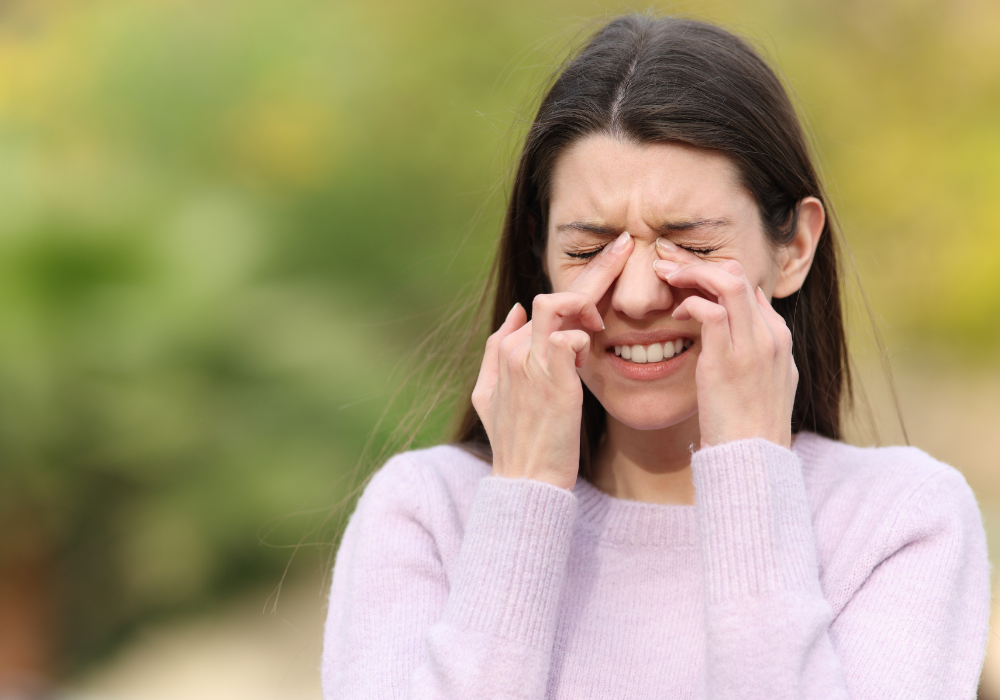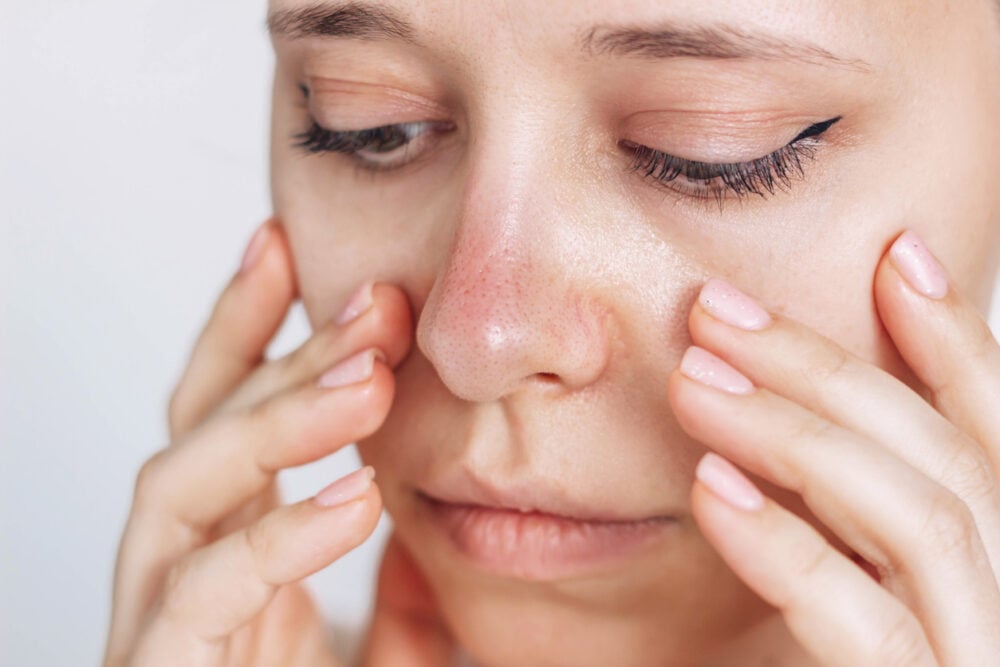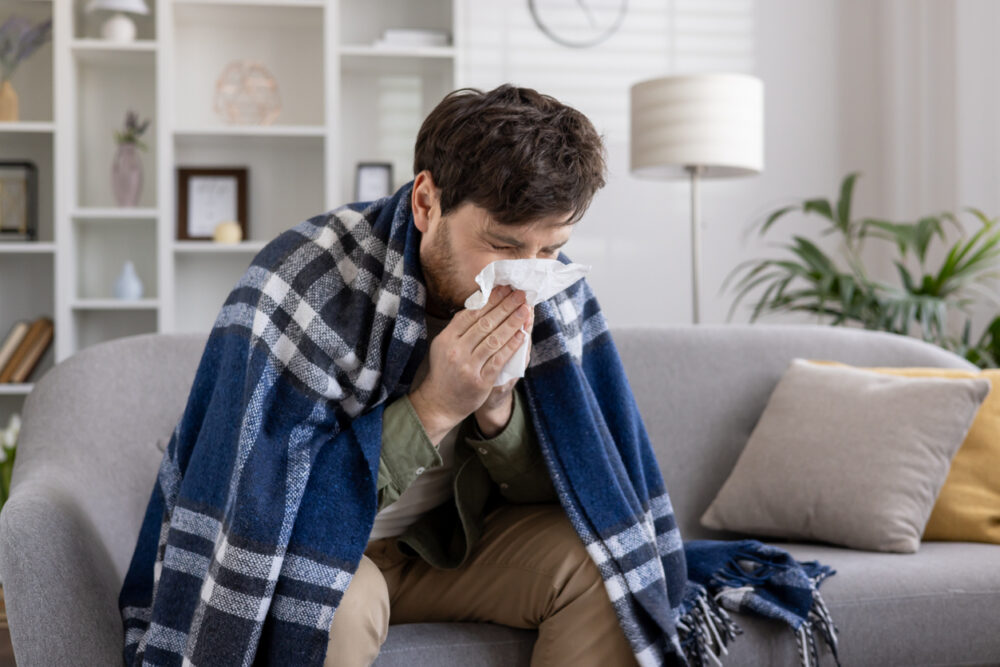Symptoms you’ve blamed on stress might actually be pollution.

You don’t need to live next to a refinery to feel the effects of bad air. Sometimes the warning signs aren’t dramatic—they’re just easy to ignore. A lingering headache. A scratchy throat. That foggy, exhausted feeling you chalk up to work stress. The truth is, polluted air doesn’t always look or smell toxic. But your body still reacts to it, often in quiet, cumulative ways.
Indoor and outdoor air pollution both play a role, from wildfire smoke to synthetic cleaning sprays. The irritants might be microscopic, but the symptoms are real—and they don’t always show up right away. Instead, they creep in slowly, disguised as everyday complaints. If you’ve been feeling “off” for a while, the problem might not be your routine. It might be the air that surrounds you.
1. Headaches become more frequent and harder to explain.

They show up without warning and don’t always follow a clear pattern. Maybe it’s behind your eyes. Maybe it lingers at the base of your skull. And no matter how much water you drink or how early you go to bed, it doesn’t always go away.
Divyani Garg and colleagues note in Frontiers in Neurology that air pollutants like PM2.5 and ozone are increasingly linked to headache symptoms due to their inflammatory effects on the nervous system. These kinds of headaches often don’t respond well to typical over-the-counter meds, and they can last longer than usual. Exposure to indoor sources like cleaning chemicals, air fresheners, or poorly ventilated gas stoves only makes it worse. If your headaches tend to spike on high-traffic days, after using certain products, or when you’re indoors too long, that’s not a coincidence. It’s your body waving a red flag.
2. Your throat feels raw, even without a cold.

It’s not a full-blown illness, but it still hurts to swallow. Your voice sounds rougher than usual, and talking too much wears it out fast. A sore throat without fever or congestion is often brushed off as dry air or allergies. Officials at the National Park Service explain that sulfur dioxide can irritate the throat and respiratory system even at low levels, especially during physical activity.
This symptom gets worse when you’re exposed to smoke—whether from wildfires, cigarettes, or incense—or when you’re in spaces with poor air circulation. HVAC systems that don’t filter properly can recirculate irritating particles, especially in offices or schools. If it feels like you always have a minor throat irritation that never fully goes away, it might be time to look at what you’re breathing in, not what you’re eating or drinking.
3. Coughing starts to feel like a habit.

It’s not the deep, hacking kind that keeps you up all night—just a quiet, persistent cough that seems to follow you around. You clear your throat constantly. Maybe it’s dry. Maybe it’s slightly phlegmy. But it doesn’t quite go away, no matter how much water you drink. That’s often a sign of low-level inflammation in your airways caused by polluted air.
Experts at the New York State Department of Health note that fine particulate matter can aggravate lung conditions and trigger coughing, even in people without existing health issues. And if you already have asthma or allergies, the coughing might get worse in response to triggers like mold, traffic exhaust, or scented products. It’s not just “dust in the air.” It’s your body trying to protect your lungs by pushing something out—over and over again.
4. Your eyes burn, itch, or stay bloodshot for no clear reason.

You’re not crying. You’re not staring at a screen all day. And yet your eyes sting, redden, and feel dry no matter how many drops you use. Air pollution, especially ozone and volatile organic compounds, can cause significant irritation to the eyes. It’s one of the earliest signs that something’s wrong with the air—your eyes react faster than your lungs in many cases. This can be especially noticeable in areas with smog, high pollen counts, or wildfire smoke.
Even indoor irritants like off-gassing furniture, perfumes, or strong cleaners can inflame sensitive tissues. You might blame allergies or tiredness, but if your eyes are constantly irritated despite rest and hydration, air quality might be the missing link.
5. You feel winded climbing stairs—but you didn’t used to.

It’s easy to blame this one on being out of shape or tired. But if you’re getting breathless during everyday tasks that never used to faze you, it might be more than fatigue. Polluted air can reduce lung function over time, even in people without diagnosed respiratory conditions. Fine particulates and nitrogen dioxide can narrow your airways and make oxygen exchange less efficient.
This often shows up as mild exertion intolerance—climbing stairs, walking uphill, or carrying groceries becomes harder. You recover more slowly. Your chest might feel tight afterward. You don’t have to be wheezing to be affected. If your stamina has dropped off without a major lifestyle change, your lungs may be reacting to long-term air quality issues.
6. Brain fog sets in more often than you’d like to admit.

You forget what you were doing. You lose your train of thought mid-sentence. Your brain feels like it’s moving through molasses. While brain fog is often blamed on stress, hormones, or lack of sleep, mounting research suggests that air pollution—especially PM2.5—can impact cognitive function. Those particles can enter the bloodstream and even cross the blood-brain barrier. Long-term exposure is linked to slower reaction times, reduced memory, and higher risks of neurodegenerative diseases. But even short-term spikes in pollution can cloud your thinking.
This is especially true in crowded cities, poorly ventilated indoor spaces, or wildfire-prone regions. If your thoughts feel sluggish no matter how rested you are, the air might be to blame—not your willpower.
7. Your skin starts acting up in weird, unpredictable ways.

One week it’s dry and flaky. The next, you’re breaking out like a teenager. Air pollution doesn’t just affect your lungs—it hits your skin, too. Pollutants like ozone and particulate matter can damage the skin’s natural barrier, leading to inflammation, accelerated aging, and sensitivity that seems to come out of nowhere.
You might notice redness, rough patches, or clogged pores even if your skincare routine hasn’t changed. Living near traffic-heavy roads or spending time in stuffy indoor air can make your skin feel tight, dull, or reactive. And because indoor air can be just as polluted—thanks to cleaning chemicals, smoke, and dust—you’re not necessarily safe just because you’re staying inside. Your skin’s trying to tell you something, and it’s not just about moisturizer.
8. You keep getting colds, but they never feel quite like colds.

It starts with a tickle in your throat. Then you feel a little tired, maybe sneeze once or twice. But the full-blown cold never arrives—and the symptoms never really leave either. Chronic low-level exposure to air pollution can weaken your immune system and inflame your respiratory tract, making it harder for your body to fight off even minor irritants.
You’re left in this gray zone of always feeling almost sick. It’s not enough to stay home, but it’s enough to drag you down. For people with asthma or chronic respiratory issues, this can snowball into more serious flare-ups. But even if you’re healthy, a polluted environment can keep your immune defenses in a constant low-grade battle. It’s not a cold—it’s your body fending off the air.
9. Sleep gets worse—and you don’t know why.

You’re tired, but you can’t seem to stay asleep. Or maybe you wake up with a dry mouth, stuffy nose, or tight chest. Indoor air quality plays a huge role in sleep, and pollutants like dust, mold,
VOCs, and particulates can subtly interrupt your body’s ability to fully rest. Even low levels of carbon monoxide or nitrogen dioxide can affect oxygen intake during sleep.
People with allergies, asthma, or sleep apnea tend to notice this first, but even otherwise healthy people can struggle. Poor air disrupts your circadian rhythm, contributes to inflammation, and makes your bedroom feel less restorative. If your sleep hygiene is solid but you still wake up groggy and unrested, the culprit might be circulating through your vents.
10. Your allergies don’t follow a seasonal pattern anymore.

Used to be, spring brought sniffles and fall brought relief. Now it feels like you’re dealing with allergy symptoms year-round—sneezing, congestion, itchy eyes. That’s because poor air quality can amplify allergic responses and trigger them outside of typical seasons. Pollution particles can also cling to pollen, making it more potent and harder for your immune system to ignore.
Indoor sources like mold, dust mites, and pet dander often get stirred up by HVAC systems or cleaning products. And because homes are built to be more airtight than ever, allergens can get trapped inside for weeks. If your allergy meds aren’t working like they used to, it might be because your immune system is fighting more than just nature—it’s battling pollution, too.
11. Your mood takes a hit—and stays low.

Feeling irritable, anxious, or just emotionally flat? Air pollution has been linked to mental health struggles, including increased rates of depression and anxiety.
Researchers suspect it has to do with inflammation in the brain and disrupted neurotransmitter function caused by chronic exposure to fine particles. It’s not just about the physical environment—it’s about what that environment does to your nervous system.
You might notice mood swings, lowered motivation, or a general sense of heaviness that doesn’t fully lift, even on good days. And while mental health is always multifactorial, dismissing air quality as a factor leaves out a major piece of the puzzle. Your brain depends on clean oxygen to function smoothly. If the air is compromised, your outlook might be, too.
12. You feel tired all the time, even with enough sleep.

It’s a fatigue that sinks into your bones. You get your eight hours, but wake up feeling like you ran a marathon. Chronic exposure to bad air taxes every system in your body—your lungs, your immune response, your detox pathways. That constant background effort can leave you feeling wiped out, even if you’re not doing anything physically strenuous.
Polluted air reduces oxygen availability and increases systemic inflammation, both of which contribute to persistent fatigue. It’s not just about exercise or nutrition—it’s about what your body is constantly working to filter out. If you’ve been dragging for weeks with no clear explanation, your environment might be quietly draining you. Sometimes the air itself is the weight you’re carrying.